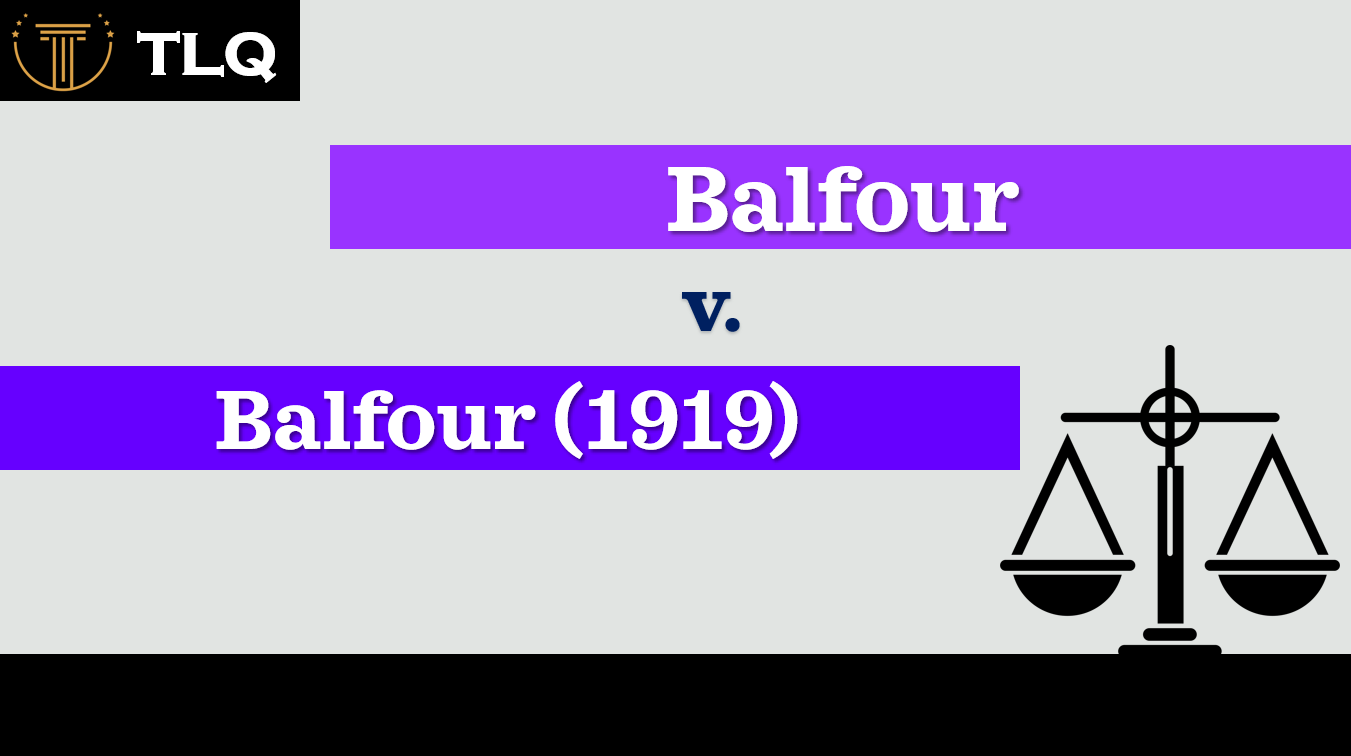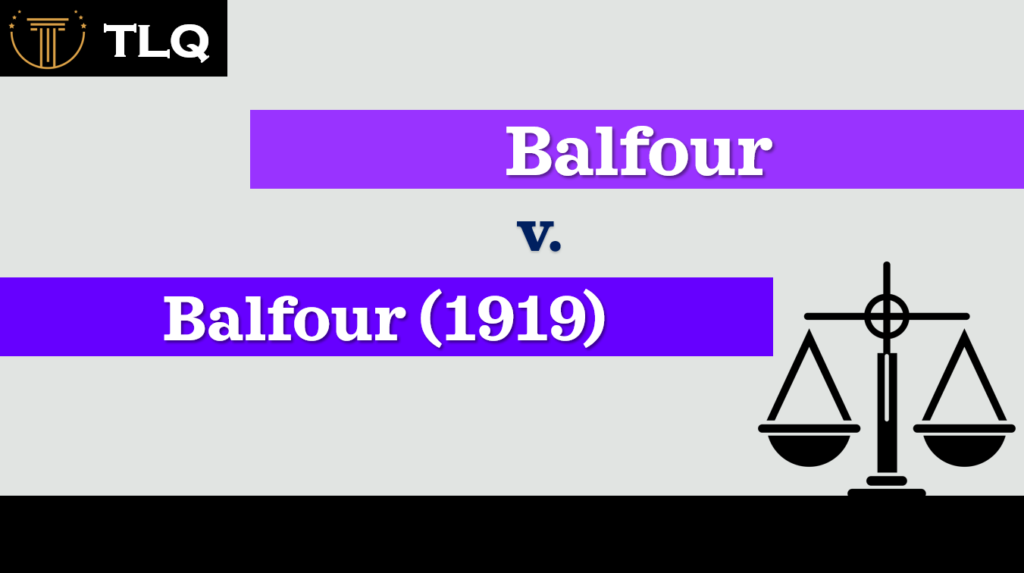Published On: 24th May, 2024

Authored By: Priya Das
Bikash Bharati Law College, University of Calcutta
- Title of the case: Balfour v. Balfour (1919)
- Name of the court: Court of Appeal (Civil Division)
- Year of the case: 1919, 25th June
- Citation(s): [1919]2 KB 571
Background of the case:
Mr. and Mrs. Balfour lived in Ceylon, where Mr. Balfour was a civil engineer. In the year 1915, they went on a vacation in England, where Mrs. Balfour fell sick. As per the advice of the doctor, Mrs. Balfour had to stay in England as the climate of Ceylon was unfriendly to her health. But Mr. Balfour had to return to Ceylon, though they made an agreement to pay €30 to Mrs. Balfour for her illness. In March 1918, Mrs. Balfour sued her husband for the non-payment of the money. In the lower court, the court gave the judgment in favour of Mrs. Balfour. After the judgment was given, Mr. Balfour appealed to a higher court, stating that this was a domestic agreement.
Brief facts of the case:
- The plaintiff, Mrs. Balfour, and the appellant, Mr. Balfour, were a legally married couple, who lived in Ceylon.
- The appellant also worked in Ceylon.
- In the year 1915, they went on a vacation in England.
- At the time of vacation, the plaintiff, Mrs. Balfour, fell sick and needed medical attention.
- That time Mr. And Mrs. Balfour, made an agreement between them, and in that agreement, Mr. Balfour agreed to pay 30 pounds to his wife for her illness every month until she returned to England after recovering from her illness.
- In the year, 1916, Mr. Balfour returned to Ceylon.
- That agreement was made when they had no problems in their relationship, and it was a quiet, happy relationship.
- Later, there was a sour arose in their relationship, due to which Mr. Balfour stopped paying the amount as agreed upon in the agreement.
- After their relationship became worse, they became separated and got divorced. As the husband failed to make payment, the wife sued him for the payment of the money.
- The case was filed in the lower court, where Sargent J. held that it was the marital obligation of the husband to pay the amount to maintain the life of the wife, and Mrs. Balfour was entitled to receive the said amount as per the agreement. The court made the decision in favour of the wife.
Prior history of the case:
When Mrs. Balfour sued against her husband for claiming the maintenance. The lower court gave the decision in favour of the plaintiff, Mrs. Balfour. It was held that the husband had the obligation to pay maintenance to his wife, to maintain her lifestyle. He was liable to pay the amount. The court enabled that the husband had the liability to pay the maintenance to her wife. Mrs. Balfour received the order of alimony and also decree nisi. As the case went against the appellant, Mr. Balfour, he appealed in the higher court.
Legal issues:
- The agreement made between the husband and wife, is it legally valid?
- Is Mrs. Balfour entitled to receive the said amount from her husband?
- Is the judgment of the lower court valid or not?
Arguments by the parties:
Arguments made on the side of Mr. Balfour’s:
The arguments made on behalf of Mr. Balfour were that there was a domestic agreement that was not enforceable by a court of law. The agreement was also made for a temporary period and the wife also gave her consent to that. The agreement was made to provide the expense for the illness of the wife. There had not any contractual obligation lies upon Mr. Balfour.
Arguments made on the side of Mrs. Balfour:
The arguments presented by her side were that there was an agreement between them, where it was clearly stated to pay the amount to her. As was the offer made by her husband and she accepted it, she was entitled to receive the amount which is legally valid.
Holding of the case:
It was held that this agreement was a domestic agreement and there was no intention of creating a legal relationship between the parties. It was held that the agreement would not be considered by law as valid and hadn’t the validity to enter into a contract as per the law. Mr. Balfour and Mrs. Balfour entered into an agreement without any intention of creating a legal relationship. There was no liability for Mr. Balfour to pay his wife the said amount as per the agreement. The contract will be held valid as per the law, if there is not only an offer and acceptance between parties, but also, an intention to enter into a legal relationship. A domestic agreement cannot be acceptable in a court of law. The agreement is considered broken, as they had no intention of creating a contract. Also, the common law doesn’t consider any agreement made between married partners for their personal things.
So, the judgment was given in favour of Mr. Balfour, as there was no legal contract as they had no intention of creating that, there was no obligation that lies upon the appellant as per the agreement.
The reasoning of the case:
As the agreement was not legal, partners, as if any agreement was made between married partners regarding any monetary transaction, it would not be considered legally binding as per the law of contract. Because a married partner doesn’t have the authority to make contracts for their personal expenses. As per the law, it will not be enforceable by a court of law. As there was no legally binding agreement between the parties, there was no liability present on behalf of Mr. Balfour. For the creation of liability, the presence of a valid contract is required.
The ratio decidendi of the case was that there must be the presence of an intention to create a legal relationship between the parties involved. In the agreement between Mr. And Mrs. Balfour, there was no intention regarding the same, and it would not be valid and not enforceable by a court of law. The creation of a legal relationship between the parties would be decided depending upon the circumstances present while making the contract.
As per the common law, while creating a contract, there must be a presence of offer and acceptance by the parties as well as the intention of creating a legal relationship is also an essential fact.
Conclusion:
For the creation of a legal contract, besides offer and acceptance, the intention to create a legal relationship is also required. In the court of law, as per common law, the legal relationship of the parties is an essential requirement. But in this case, there was a domestic agreement between the husband and wife. And the law doesn’t consider any contract made between spouses for their personal matters. So, the higher court gave the decision in favour of Mr. Balfour as there was no presence of a legal contract between the parties.





